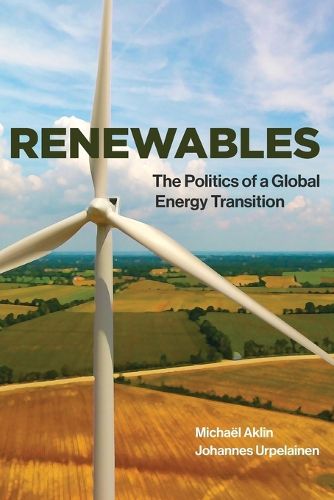Readings Newsletter
Become a Readings Member to make your shopping experience even easier.
Sign in or sign up for free!
You’re not far away from qualifying for FREE standard shipping within Australia
You’ve qualified for FREE standard shipping within Australia
The cart is loading…






A comprehensive political analysis of the rapid growth in renewable wind and solar power, mapping an energy transition through theory, case studies, and policy.
Wind and solar are the most dynamic components of the global power sector. How did this happen? After the 1973 oil crisis, the limitations of an energy system based on fossil fuels created an urgent need to experiment with alternatives, and some pioneering governments reaped political gains by investing heavily in alternative energy such as wind or solar power. Public policy enabled growth over time, and economies of scale brought down costs dramatically. In this book, Michael Aklin and Johannes Urpelainen offer a comprehensive political analysis of the rapid growth in renewable wind and solar power, mapping an energy transition through theory, case studies, and policy analysis.
Aklin and Urpelainen argue that, because the fossil fuel energy system and political support for it are so entrenched, only an external shock-an abrupt rise in oil prices, or a nuclear power accident, for example-allows renewable energy to grow. They analyze the key factors that enable renewable energy to withstand political backlash, andt they draw on this analyisis to explain and predict the development of renewable energy in different countries over time. They examine the pioneering efforts in the United States, Germany, and Denmark after the 1973 oil crisis and other shocks; explain why the United States surrendered its leadership role in renewable energy; and trace the recent rapid growth of modern renewables in electricity generation, describing, among other things, the return of wind and solar to the United States. Finally, they apply the lessons of their analysis to contemporary energy policy issues.
$9.00 standard shipping within Australia
FREE standard shipping within Australia for orders over $100.00
Express & International shipping calculated at checkout
Stock availability can be subject to change without notice. We recommend calling the shop or contacting our online team to check availability of low stock items. Please see our Shopping Online page for more details.
A comprehensive political analysis of the rapid growth in renewable wind and solar power, mapping an energy transition through theory, case studies, and policy.
Wind and solar are the most dynamic components of the global power sector. How did this happen? After the 1973 oil crisis, the limitations of an energy system based on fossil fuels created an urgent need to experiment with alternatives, and some pioneering governments reaped political gains by investing heavily in alternative energy such as wind or solar power. Public policy enabled growth over time, and economies of scale brought down costs dramatically. In this book, Michael Aklin and Johannes Urpelainen offer a comprehensive political analysis of the rapid growth in renewable wind and solar power, mapping an energy transition through theory, case studies, and policy analysis.
Aklin and Urpelainen argue that, because the fossil fuel energy system and political support for it are so entrenched, only an external shock-an abrupt rise in oil prices, or a nuclear power accident, for example-allows renewable energy to grow. They analyze the key factors that enable renewable energy to withstand political backlash, andt they draw on this analyisis to explain and predict the development of renewable energy in different countries over time. They examine the pioneering efforts in the United States, Germany, and Denmark after the 1973 oil crisis and other shocks; explain why the United States surrendered its leadership role in renewable energy; and trace the recent rapid growth of modern renewables in electricity generation, describing, among other things, the return of wind and solar to the United States. Finally, they apply the lessons of their analysis to contemporary energy policy issues.